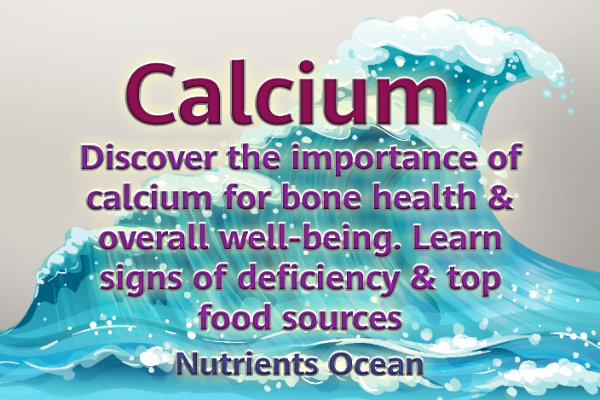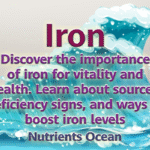Calcium
It is the mineral that is often associated with strong bones and teeth. But its role in our body goes far beyond just skeletal health. Let’s delve into the importance and various health benefits of calcium, as well as the signs, symptoms, and methods of determining its deficiency.
Importance of Calcium
Calcium plays a vital role in numerous bodily functions, making it an essential nutrient for overall health and well-being. Here’s why it’s crucial:
1. Bone Health:
Most of the body’s calcium is stored in bones and teeth, providing structure and strength. Adequate calcium intake is crucial for building and maintaining healthy bones, especially during childhood, adolescence, and older adulthood when bone formation and density are critical.
2. Muscle Function:
Calcium is involved in muscle contraction and relaxation, including the beating of the heart. It helps regulate muscle contractions, ensuring smooth movement and preventing muscle cramps.
3. Nerve Transmission:
Calcium ions play a key role in transmitting nerve impulses throughout the body. They facilitate communication between nerve cells, enabling essential functions such as sensation, movement, and cognition.
4. Blood Clotting:
Calcium is essential for the process of blood clotting, which helps prevent excessive bleeding when injuries occur. It works in conjunction with other clotting factors to form a stable blood clot.
Health Benefits of Calcium
In addition to its fundamental roles, calcium offers several health benefits:
1. Prevention of Osteoporosis:
Adequate calcium intake, combined with other bone-supporting nutrients like Vitamin D, magnesium, and phosphorus, can help reduce the risk of osteoporosis and fractures later in life.
2. Dental Health:
Calcium contributes to the strength and integrity of tooth enamel, helping to prevent tooth decay and cavities.
3. Blood Pressure Regulation:
Some research suggests that calcium may help regulate blood pressure, potentially reducing the risk of hypertension and cardiovascular disease.
4. Weight Management:
Calcium may play a role in regulating body weight by promoting a feeling of fullness and increasing fat metabolism.
Food Sources of Calcium
Here are some food and natural sources of calcium along with brief explanations:
1. Dairy Products:
Dairy foods like milk, cheese, and yogurt are rich sources of calcium. They also provide other essential nutrients such as protein, vitamin D, and phosphorus, which support bone health.
2. Leafy Greens:
Dark, leafy greens such as kale, spinach, collard greens, and bok choy are excellent plant-based sources of calcium. These vegetables are also high in vitamins, minerals, and antioxidants.
3. Sardines and Salmon:
Canned sardines and salmon with bones are rich in calcium. Consuming these oily fish varieties provides not only calcium but also omega-3 fatty acids, which are beneficial for heart and brain health.
4. Fortified Foods:
Many foods are fortified with calcium, including orange juice, plant-based milk alternatives (such as almond milk, soy milk, and oat milk), tofu, breakfast cereals, and bread. Fortified foods are particularly beneficial for individuals who may not consume dairy or other traditional sources of calcium.
5. Almonds and Sesame Seeds:
Nuts and seeds, particularly almonds and sesame seeds, contain calcium and other nutrients that support bone health. These can be enjoyed as snacks or incorporated into various dishes and recipes.
6. Figs and Oranges:
Certain fruits like figs and oranges also provide small amounts of calcium. While they may not be as high in calcium as dairy or leafy greens, they contribute to overall calcium intake when included as part of a balanced diet.
7. Beans and Legumes:
Beans and legumes such as chickpeas, lentils, and white beans contain moderate amounts of calcium. They are also rich in fiber, protein, and other essential nutrients, making them a valuable addition to a calcium-rich diet.
Incorporating a variety of these foods into your meals and snacks can help ensure an adequate intake of calcium to support bone health and overall well-being.
Signs and Symptoms of Calcium Deficiency
When the body lacks sufficient calcium, it can lead to various symptoms and health issues, including:
1. Weak or Brittle Bones:
A common sign of calcium deficiency is weak, fragile bones, which increases the risk of fractures and osteoporosis.
2. Muscle Cramps:
Inadequate calcium levels can result in muscle cramps, particularly during physical activity or at night.
3. Tooth Decay:
Insufficient calcium intake may contribute to tooth decay and dental problems, such as cavities and weakened enamel.
4. Numbness and Tingling:
Calcium deficiency can affect nerve function, leading to sensations of numbness, tingling, or muscle spasms.
Ways to Determine Calcium Deficiency
If you suspect a calcium deficiency, several methods can help confirm the condition:
1. Blood Tests:
A blood test can measure the level of calcium in your bloodstream. Low levels may indicate a deficiency, although it’s essential to consider other factors such as vitamin D levels and parathyroid hormone levels.
2. Bone Density Scan:
Dual-energy X-ray absorptiometry (DEXA) scan measures bone mineral density, providing information about bone health and the risk of osteoporosis.
3. Medical History and Symptoms:
Your healthcare provider will inquire about your medical history and symptoms, including any fractures, muscle cramps, or dental issues, to assess the likelihood of a calcium deficiency.
In conclusion, calcium is a vital nutrient that supports various aspects of health, including bone strength, muscle function, nerve transmission, and blood
clotting. Ensuring an adequate intake of calcium through dietary sources such as dairy products, leafy greens, and fortified foods is essential for overall well-being. Recognizing the signs and symptoms of calcium deficiency and seeking appropriate medical evaluation can help prevent potential health complications associated with inadequate calcium levels.




